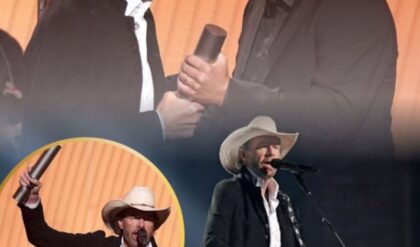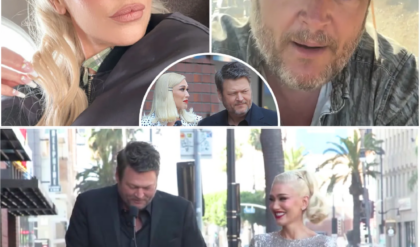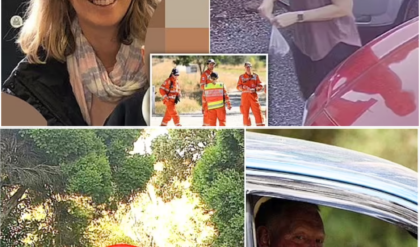:max_bytes(150000):strip_icc():format(webp)/falling-skies-411-01-8b1bdd6d2c114220927b8c1a4d63226e.jpg)
PHOTO: JAMES DITTIGER/TNT
Falling Skies wrapped up its fourth season Sunday with what may be the show’s most hopeful yet most enigmatic season closer.
SPOILER ALERT: Details of tonight’s season 4 finale lie ahead!
The last couple minutes of the two-hour finale ended on a very hopeful note back on Earth. As Hal says, “The Espheni are sitting ducks for a change,” thanks to Lexi’s sacrificial destruction of the aliens’ power core. But above Earth’s atmosphere, things got really weird — the kind of weird that should have fans theorizing and debating throughout the long wait to the fifth and final season.
Noah Wyle (Tom Mason) tells EW that when he read the last page of that finale script, he thought, “This is insane!” He called showrunner David Eick — who took the helm of Falling Skies at the start of season 4 — and said, “Are we talking about another alien race? Please tell me we’re not talking about introducing another alien race. This is the time in the show when we need to be wrapping up loose ends, not creating new ones.” The actor recalls that Eick (a Battlestar Galactica alum) then “pitched this storyline to me that I thought sounded pretty good, so I went, ‘Oh! Okay. Let’s do that.’”
So what was Tom looking at in the last shot of the finale? Wyle teases, “All I’ll say is it’s not a new alien race that we’re looking at. It is something we haven’t met before, but it’s familiar.”
Is it an alien hybrid? Is it artificial intelligence? Is it something with the DNA of a specific character we’ve met before, like Rebecca? Eick, of course, isn’t going to supply the answer just yet, and he was careful to not commit to calling that thing in the mirror an “alien” or even a “creature.”
But the showrunner did break down that scene a bit for EW during a break from his busy schedule prepping for the last season of Falling Skies. Read on for what he had to say about that scene, about why Lexi ultimately chose to side with her human family, and about the mystery of the Espheni’s motivations for invading Earth.
DAVID EICK: Of course, I’m not at liberty to deliver fully disclosed spoilers, but I will tell you that what Tom does see will prove to be the sort of lynchpin in what drives [the 2nd Mass] and provides a strategic angle for the 2nd Mass to pursue in the fifth season. I wouldn’t say they discover a doomsday device, but what they discover is a strategic weapon of sorts that will prove to have a great impact on what happens in the fifth season.
So this creature Tom sees will launch more war strategy elements for the show — will it also play a part in the family drama, more emotional elements of the show?
It is a more emotional, internal motivation that propels Tom Mason in season 5. It’s not just about tactics or looking at war room maps, although that remains a big part of the show. It’s about how even the best generals will tell stories about how they had to rely on their gut, and [season 5] is a season in which the gut aspect of Tom Mason’s approach to defeating the enemy takes on a much more prominent role via the encounter he has at the end of season 4. So through that encounter we will emphasize the emotional aspects of his decision-making, his strategy, and the ultimate outcome.
You know fans are going to pick apart every piece of that scene – did you and your team put a lot of thought into which clips from speeches and music to use and what paintings to put on the wall?
Yeah. The specific ideas that you see in the show were a little bit different than what was scripted, which was “When a Man Loves a Woman” [by Percy Sledge]. The rights for that were a little outside our budget. What we came up with, I thought, built the same emotion of nodding to a part of American or, I guess, human culture that is so indelible and specific that it’s undeniable. So you would hear that and go, “Oh my God, that’s a friend. There’s a friend nearby” or “There’s someone who understands me. Whether they’re trying to manipulate me, whether they’re trying to trap me, or whether they’re a friend, they at least get where I come from.” That’s the first moment where we might have some hope about what he might encounter in this environment. But the specifics are everything, right? You gotta find the things that really pull those strings. FDR’s speech was always in the script, and it was just sort of a more general cacophony of voices and music. Our post-production supervisor, in realizing that “When a Man Loves a Woman” was outside our budget — he had the idea to use the electric guitar of “The Star-Spangled Banner,” which is not the Jimi Hendrix version, but it evokes that, and I actually thought that was better.
Was there a lot of talk among the writers and the visual effects team about just how clear to make that thing in the mirror, just how out of focus she’d be?
That went back to even the writers’ room when we were breaking the story. In terms of what it is conceptually and how much we’re showing the audience and what we’re hiding, that was all by design months and months [before filming that scene].
At Comic-Con you said we shouldn’t expect to see any more new alien species on the show, but we may see hybrids and mutations of species we’ve met before. Is this creature in the mirror an example of that?
Well, I certainly don’t know that it’s a creature, but in terms of of seeing things we’ve met before, the great thing about this show was the DNA of it — which Robert Rodat and others were involved in creating — really laid the groundwork for a great deal of evolution of some of these creations. So once you say that there’s this race called the Espheni and we determined that their M.O. is playing with DNA, playing with genetics. That’s a great fertile soil to plant a whole bunch of things in. There’s this sort of ruthlessness that the enemy has, as we saw with the humanoid skitters last year, about the pain it may inflict with these creations, only that they kind of do their bidding.
Did this final scene have any influence from the end of 2001: A Space Odyssey?
Yes. Yeah, the last line [in this finale] is sort of our nod to “It’s full of stars,” which is a great last line from 2001. That was definitely not only a conceptual influence, but an aesthetic influence. The sort of cleanless and the starkness of the environment Tom’s in is our cable budget version of what Kubrick did to evoke a sense of isolation and all that kind of stuff.
Why did you decide to have Lexi ultimately side with her human family, rather than use her powers for the Espheni’s cause?
It just seemed like the show’s always been about family first. I said when I was initially meeting with everybody about it, “It’s a family drama writ large.” Before you say it’s sci-fi, before you say adventure, before you say action show, you say family drama, and it all emerges from there. So I feel like for Tom and Anne to have this daughter, I didn’t mind putting them through hell and punishing the characters as ruthlessly as I could possibly think of, but I certainly felt that in the end we should continue to believe that family is the most important and most critical weapon and sort of ideal that fuels the show and Tom Mason. I just didn’t want to see their daughter turn out to be something profoundly evil. She can make mistakes — she even killed somebody. But in the end, she opts for a choice that serves our larger theme of family.
What happened to Mira, the reeducation camp girl? Was she still alive on the ship when Lexi flew it into the Espheni power core?
I gotta imagine so. You didn’t really see her except that she sort of scooted away. From my standpoint, because she was on that ship when the ship completely immolated, we’ve gotta assume that Mira is no more.
Let’s talk about another character death — why did you decide to kill off Lourdes and kill her in that way?
Lourdes seemed perfect because she’s likable, and also because between the eye worms from season 3 and her assassination of the president to her shifting to Lexi’s side, clearly the character had a bit of a screw loose or a bit of a weak constitution when it came to influence, so I guess on that level she seemed like a fun one to kill too.
[Seychelle Gabriel] and I had a number of discussions about it, and of course she was upset and not happy ’cause she really loved doing the show. The most important thing for me was to make sure she knew it wasn’t a cliche of “you’re killing off characters because you don’t like the actor.” She was really one of my favorites in the cast. It was really hard. I can think of a thousand things I would have loved to do with Lourdes, but on the other hand, if all you do is kill extras, no one cares after a while.
I know before Lourdes’ death, the show was getting some criticism that all the main characters in this ensemble cast seemed indestructible, that the Masons especially were escaping death too easily again and again.
I wasn’t aware that that was a criticism, but to me, it seemed natural and obvious that when you’re doing a war show, you gotta every year basically pick somebody and kill them. In sci-fi, in a war drama certainly, if you don’t kill somebody meaningful and important from time to time, it starts to ring a little hollow. Certainly everyone involved in making an ensemble show with any kind of violence, anybody who saw the “Red Wedding” episode of Game of Thrones was inspired by that.
Fans are still waiting to learn why the Espheni really invaded. Is the answer to that question pretty much the same as it was when former showrunner Remi Aubuchon left the show, or have you expanded on it at all?
Remi and I know each other. Remi was involved in co-creating Caprica. So he and I have actually created a show together, and we spend a lot of time together. I had several conversations with him about the show and about that question. I would say we’ve taken the essence of the idea that was there from the beginning about what motivated the Espheni to invade, and we’ve now not just added to it, but reformulated the show to support a more specific take on the original idea, which is what any show would do as you got closer and closer to the end. You have an idea of how it ends, but you start lining up the specifics and making little tweaks and changes and asking, “What if this was really the secret reason behind the reason?” All kinds of subtext and layers can come into play, which is fun, and which I think the audience is sort of expecting. If if we just said, “They need our water,” the audience would say, “Bullsh–.”
What other teases can you give us about why fans should be excited for season 5?
The tease I will leave them with is that whatever reason they think is behind the Espheni’s invasion is absolutely wrong. And I’m really excited about the depths that we’re going to explore in the culture of the Espheni this coming final season.




